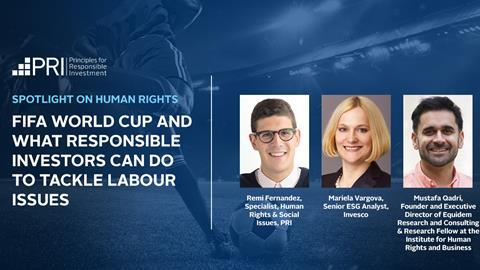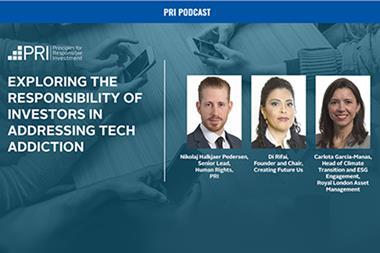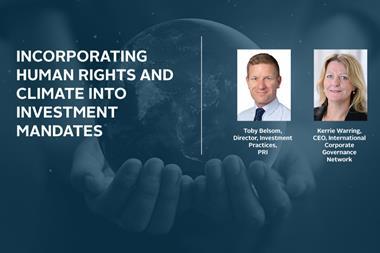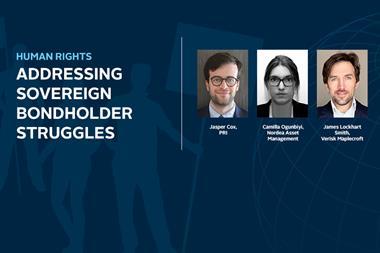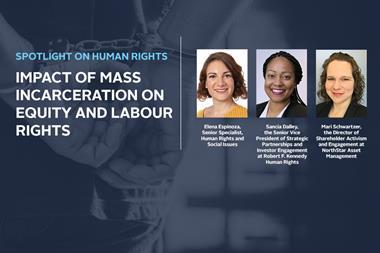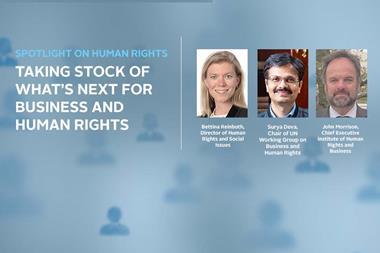Find the transcript here
FIFA World Cup: What responsible investors can do to tackle labour issues
Remi Fernandez
Hello and welcome to this PRI podcast, the newest episode in our spotlight on human rights series. My name is Remi Fernandez and I am part of the human rights and social issues team and hosts of today’s podcast. Today we’ll be exploring human rights issues in major sporting events with a spotlight on FIFA. In particular, migrant work and what responsible investors can do. So major sporting events such as the FIFA World Cup, have historically received a lot of attention from the public for their associated human rights abuses. And while there has been some progress in labour rights, in more recent years, cases of labour exploitation persist across the FIFA ecosystem. So, what can we do as responsible investors to address this issue? Today I’m joined by Mustafa Qadri, the founder and executive director of Equidem Research and Consulting, and a senior research fellow at the Institute for Human Rights and Business, as well as Mariela Vargova, a senior ESG analyst at Invesco.
Mustafa Qadri
Thank you for having us.
Mariela Vargova
Thank you.
Remi Fernandez
Kicking off our podcast today, I wanted to turn to you Mustafa in terms of identifying what the key human rights issues are and also what the investor exposure is to these issues.
Mustafa Qadri
There are a number of key human rights issues to think about. Obviously, human rights covers the gambit of human experience, but in terms of supply chains and the kind of work that we do, it mostly focuses on forced labour, modern slavery, some aspects of freedom of expression and freedom of peaceful assembly. So, what does that mean in practice? It means that workers being in situations where work is being exacted out of them, they’re forced to work under the menace of a penalty, that you’re basically in a condition that you would not work in, where not for the fact that you are worried about a real or perceived threat. When we think of forced labour, modern slavery, very easy to think about workers in a slave labour camp chains on their ankles. Sadly, that does still exist in many places, but in fact, forced labour can often be quite an invisible force on workers.
Mustafa Qadri
We did a report recently about the conditions for hotel workers in Qatar and other Arab golf countries, some of the most prestigious locations to work in for workers that work overseas. And yet those workers were charged large recruitment fees, illegal fees back home, which meant that the moment they got that job, they were in a situation of debt bondage. When they arrived in the country, their pay was much less than promised. The kind of work they had was much worse. They often worked longer hours than they were compensated for. Those are the kinds of things that indicate force labour when it comes to supply chains. Those are the kind of human rights issues that we are dealing with. But why force labour is a very good indicator to focus on. Number one is, the forced lever conventions. These international treaties, basically that states around the world sign up to. It’s one of the most ratified conventions states have committed in law that they will protect against it. So that’s number one. It’s one of the most universal standards across cultures and ideologies and geographies. But the second reason is that with millions and millions of workers in the supply chains of businesses that really drive value for the global economy, it’s probably the most common type of exploitation that workers face.
Remi Fernandez
Well, you touched upon debt bondage in terms of what that exactly is. Do you mind outlining that?
Mustafa Qadri
It’s quite a dramatic term when you think about it. It’s often described as debt slavery as well, and it really is, as the name suggests on the tin, it’s basically a situation where someone has a financial burden over them, a debt, which then effectively allows the person exploiting them to control their work environment or their life. So, a really good example is I live somewhere like Kenya. I come from a very rural or remote part of the country. There are very few good jobs on offer, and I see advertisements on Facebook to work in a construction site or in a hotel somewhere in Europe, somewhere in South Africa, something like that. I speak to the agent who has their number on the advertisement, and they say, give me your passport and pay me roughly a thousand US dollars. So quite a lot of money given that I don’t actually have much money, I’m actually looking for work to make money.
Mustafa Qadri
So, the moment that I go and seek a private loan shark, because I don’t have any kind of credit history, I don’t have a bank account, I have to go to these loan shots with these ridiculously high interest rates to get a loan to pay for that job, I’m basically immediately in a situation of debt bondage. My focus isn’t on whether my employer down the stream is going to shout at me or whether my accommodation is disgusting or whether I’m working 15-hour shifts. My focus is on how do I pay off this debt as quickly as possible? And employers and those who exploit workers, they know this. So, it’s actually a system, it’s an illicit economy. It’s about profit generation on the back of the most vulnerable.
Remi Fernandez
You mentioned loan sharks as being one of the key actors that is sort of, I guess, capitalizing on the vulnerability of migrant workers. Mariela, what are your views on the investor role and what actions are usually undertaken by investors to support safeguards in major sporting events?
Mariela Vargova
From an investor perspective, the issue of human rights at mega sporting events like the World Cup is material. It’s about corporate responsibility, brand reputation, and responsible business practices. Besides celebrating achievements, these events are also revenue generating business enterprises. So, the International Federation of Association Football, also known as FIFA Partners with many companies, including some of the most recognizable brands in the world. The situation highlights a complex issue for investors. The protection of human rights at this mega sporting event is not only about sponsors and partners, but about our commercial partners. It impacts also many corporate sectors, airlines, hotels, restaurants and resorts, and also advertising brands, media and entertainment companies, food and beverage, and of course apparel. So, investors expect companies involved to recognize the materiality of human rights protection and due diligence prior, during, and after big sporting event. But then again, which specific human rights are we focusing on here?
Mariela Vargova
And we need to consider as investors a broad set of human rights, including but not limited to risks of human trafficking and modern slavery, providing decent workplace conditions and fair living wage for workers, especially migrant workers. As Mustafa highlighted, human rights are about rights of athletes as well, freedom of expression, freedom from discrimination and human rights are also about access to justice and remedies. So, it’s a very complex issue for investors and need to spend time research and engagement in all these complex areas of various industries, various human rights, and to map those in order to have an effective impact.
Remi Fernandez
Mustafa, Mariela mentioned the sort of ecosystem and partnerships and companies. Is there anything you wanted to add on in terms of what investors should be paying attention to in terms of the key actors driving this abuse across the FIFA ecosystem?
Mustafa Qadri
Yeah, I think it’s a key question to ask about how do investors get involved in that ecosystem? If you just look at FIFA and the Qatar World Cup, obviously there is the host government, the state of Qatar, there is FIFA, the world body governing soccer or football. There’s the corporate sponsors. Then of course there’s a range of corporate actors who are building stadiums, manning hotels, putting together infrastructure. It is the broadcasters, you know, people that we’ve actually been working with a lot as a consultancy around not just their broadcast, although that’s part of it from a human rights perspective, but also as a business enterprise with a huge operation to broadcast the tournament. In the Qatar context, quite uniquely, you also have international trade union federations, bodies that represent trade unions in Qatar, a country which outlaws it, criminalizes trade union activity.
Mustafa Qadri
So, I’ve had the benefit or otherwise to be monitoring it for 10 years. And what’s really struck me is that it’s a largely top-down focus on human rights. There tends to be, I think, personally an over focus on enterprises and sites when it comes to human rights impact that are contractually linked to Qatar or FIFA, rather than a more holistic approach to the human rights situation. In a country where there are very limited civil political rights. Bringing that local partner, in this case a government on that journey of reform that’s not just limited to specific sites or specific issues, but is a holistic journey. If you’re an investor, there’s no question, you look at these kinds of situations and it must be really overwhelming. I mean, it’s overwhelming for me as a human rights professional, but you know, at the same time you can narrow it down.
Mustafa Qadri
Firstly, the exercise of trying to get a sense of what is the likely human rights harms that you’re going be exposed to. What other people and what kind of work are they doing? As much as possible, actually working with the human rights community, working with civil society, as Mariela said, understand fully what is the situation? With the Qatar World Cup, investors can play a critical role as the good global citizen. Qatar and FIFA are in the country for the purpose of making a lot of profit. That’s the primary reason. And so, investors are very central to the key audience for the tournament organizers. So, there is an opportunity there to be really raising your voice about concerns and asking for, not just within the tournament, how those issues will be addressed. What’s the longer-term investment? For example, we know the modern slavery, the forced labor situation in Qatar quite well, but if it’s say, gay rights or women’s rights in Qatar, then these are global issues.
Mustafa Qadri
We can no longer hide behind this idea that if you come from a certain country or culture, cultural religion, that that has a different standard or that you know you are, you’re imposing western standards. That doesn’t really apply anymore to those very fundamental points of human rights now. And it’s a bit late now, obviously, but there should be questions being asked around what is Qatar’s journey to address that? Having those kind of honest conversations that don’t need to be public conversations. There can be private conversations with local stakeholders or fifa, anyone to say that we expect to see a more longer term sense of what is the reform journey, not just an approach that is saying at stadiums, if you happen to be gay or someone who has a certain political opinion, you won’t get harassed. But those areas are highly controlled and the moment that we all leave the big tournament, there’s no actual deeper investment in respecting human rights in that country.
Remi Fernandez
I think you raised some interesting points, here. It’s so important to have a multistakeholder approach and it’s not just an activity that ends once the World Cup is done, it requires ongoing engagement for an investors, it’s sort of like, you know, where do we even begin with addressing this issue and how do we ensure that we’re engaging the right stakeholders. Coming to you, Mariela, what is the investor role in supporting safeguards in countries that might have weak legislative safety nets? And what are some of the challenges that you, you faced in this process?
Mariela Vargova
We have a big concern here. Only few of the sponsors of this year’s World Cup have proactively engaged with the issue. Investors should know what the corporate partners and sponsors of the World Cup are doing to protect human rights and to mitigate potential wrongdoings. My advice to the investment community is to start engaging today, engage with your invested companies that are partners and sponsors of the World Cup investors need to ensure that the companies involved contribute to a responsible sporting event to determine whether they do. We can ask questions like do these companies have human rights policies and processes in place, and how do they monitor those and what is their level of accountability? Are those policies align with the United Nations guiding principles on business and human rights, which include the protection, respect, and remedy of human rights. All these are actionable steps for companies to fulfil their duties and responsibilities in preventing human rights abuses and providing remedies for any identified abuses.
Remi Fernandez
Thanks for providing that outline of how investors can begin to address and start tackling these issues. But for those investors that haven’t yet engaged with this issue, might be sort of holding back on it, what do you think are some of the key barriers they’re facing at the moment in terms of becoming involved in addressing this issue?
Mariela Vargova
Well, the protection of human rights at big sporting events is a global and systemic issue. That’s what the investment community needs to realize because human rights abuses can happen anywhere. We saw investor campaigns during the 2010 World Cup in South Africa during the 2012 London Olympics and even at the Super Bowl events in the United States. And also, another point, another angle for investor concern is that in addition to being a responsible event, we expect brands and companies to be sustainable because this mega sporting event should not create a negative impact on communities or on the environment. They should maintain environmental sustainability and improve quality of life. So, a lot of important sustainable and responsible requests from investors and expectations, high expectations for mega sporting events in general.
Remi Fernandez
In sort of responding to that, when you are thinking about the responsibility for investors to respect human rights, what do you think are some of the challenges they’re facing? Or what would you sort of hope to see more of from the investor community with regards to FIFA and major sporting events?
Mustafa Qadri
There are a number of challenges, and as Mariela said, you know really clearly there is that, that magnitude of the problem. I think that can seem really overwhelming cause there’s so many dimensions to human rights in any context. But say in the Qatar context, it’s really, really wide. One context we often don’t talk about is the fact that apart from the forced labour issue, the gender rights issue, sexuality, rights, issues, and freedom of expression, Qatar is per capita the highest contributor in the world to CO2 emissions. And so, what that means is that, in fact are we being complicit? You know, nothing against Qatar. Personally, I think the countries that I’ve always met, have always been very welcoming, always willing to have dialogue with me and I respect that. But is there a complicity there with a country that is built on its economy, is built on something that we know as investors is not something that we can be really investing in.
Mustafa Qadri
So how do you unpack that? One is obviously the low hanging fruit. If you look at the sponsors who are there in Qatar with the World Cup, these are, you know, brand names. So, the main credit card companies, car companies, beverage companies that are not just present in this one country, not just present in this one mega event, but are going to be present across different sporting events and those sorts of tournaments. So, in a way they have a footprint and therefore a responsibility that is global. So, it’s an opportunity to really address that. And one thing that Equidem and other human rights community actors have been talking about is workers should be paid money owed to them. If they’ve been charged illegal fees, get that reimbursed. That seems to be the most common type of issue that workers face. If Qatar and FIFA are saying that on World Cup sites that this should not be happening.
Mustafa Qadri
But as our research has shown perhaps more than anyone else’s, it’s still a problem. Sponsors can really lead on saying, well, let’s seek to address that now. There’s quite a bit of technical discussion in good with a number of the sponsors and what would that look like? So, in fact you can actually get quite involved as an investor in talking to sponsors, companies you’re likely invested in around what you should support around that. The second aspect is around going forward in terms of how do you benchmark and how do you assess that there’s a risk there. Where do you decide to activate your leverage and building those coalitions, be there amongst investors, industry bodies, United Nations or other multilateral initiatives to make sure that those actual principles are applied in a certain context. So, it could be around zero fee recruitment or workers. It could be around safe workplaces for women and other minorities, you know, whatever it might be.
Mustafa Qadri
And that is, I say medium because there are things that immediately can be addressed, but it’s about setting the benchmark for the future. Because in the Qatar example, as much as there are serious challenges, if there is a positive, it is, we have a real-life concrete example that we can use as lessons for the future. And one of the lessons we have from that tournament is that FIFA placed no human rights requirements in the bidding process for this tournament, which Qatar eventually won. So, we were always working backwards from a really difficult situation. So those standards, working with multi-stakeholder initiatives as investors is important to then make sure future events have a much higher threshold. Now the third thing goes a little bit to this issue of decarbonizing the economy is basically taking a very intersectional approach, which is trying to bring all the different human rights and environmental social issues together.
Mustafa Qadri
And thinking about as investors, global citizens, what’s the role that you want to play? What are the opportunities to shape the discussion? And saying that, yes, these problems are really big, but the opportunity to change lives in a positive way. It’s also really, really immense. And people talk about the rise of China and the bricks nations and that’s certainly true, but the reality is, is that investors, particularly in the most regulated markets, as imperfect as those regulations are still really dominate large chunk of the investor world. And there’s a real space there to be showing leadership and trying to find partnerships because particularly in emerging economies, even as the wealth is growing in many of these countries, one thing that people in those places also value is reputation is to be seen as being, you know, positive global citizens. It is a tougher thing, it’s more longer-term thing, but it’s about investors playing a role in really leading better corporate practice amongst their peers in a structural way. This can make a real difference in people’s lives. And what worked in things like the Qatar World Cup, what didn’t work out, why is that? You know, should we be using our leverage sooner in the situation than we currently are? I think those are some of the things to really be thinking about.
Remi Fernandez
You very used to interesting points in terms, you know, what are these low hanging fruit that we can tackle? How do we deal with this in terms of reputation and longer term and in terms of broader decarbonization strategies? I agree entirely, FIFA’s not going anywhere, and neither are major sporting events turning to Mariela in terms of what you’re seeing in the investment community, are there any improvements? Is there sort of momentum towards a more sustainable and I guess, improve situation in future major sporting events and investors are taking this on? Or what’s your view from the ground?
Mariela Vargova
The issue of human rights at mega sporting events has been on the investment community’s radar for quite some time. The Celebration Without Exploitation campaign was launched by the Interfaith Center on Corporate responsibility in the United States over 10 years ago to specifically address the risks of human trafficking during big sporting events. And I also would like to share a very valuable source for investors, which is the Business and Human Rights resource centre. They have a website dedicated to any development and insights on the World Cup. I want to reconfirm again, as Mustafa said, multi-stakeholder approach is extremely important. Investors sharing their insights with non-governmental organizations, with companies and with invent organizers can only improve awareness and help mitigate risks. So, we need to be together in this endeavour to ensure the implementation of the UN guiding principles on business and human rights. I think this is a core objective and it’s doable and it’s actionable.
Remi Fernandez
I was going to end this a call to actions, but I think we’ve sort of have it there in terms of what investors need to be doing and how they need to be going about it. I think that wraps it up for our podcasts today. So again, Mustafa. Mariela thank you for your precious time, insights, and experience. With the 2022 fee for World Cup insight. The importance of addressing this issue is just ever more present. We hope to see greater investor action being put to address human rights issues in major sporting events like FIFA and all that is to come in the future. Do stay tuned for our next PRI podcast, which will focus on COP 27 more information on responsible investment. Visit our website at https://www.unpri.org/.


